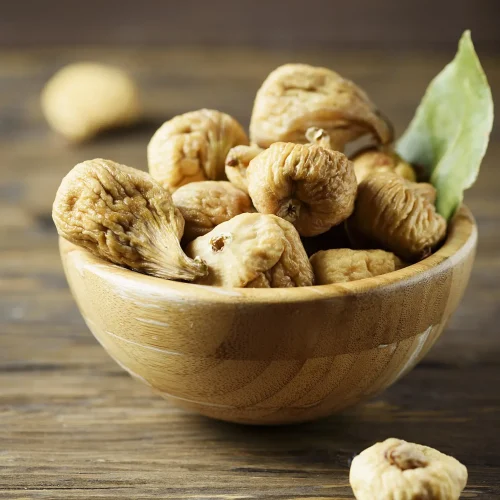Dried Figs

Dried Figs (Anjeer)
The fig is the edible fruit of Ficus carica, a species of small tree in the flowering plant family Moraceae. Native to the Mediterranean and western Asia, it has been cultivated since ancient times and is now widely grown throughout the world, both for its fruit and as an ornamental plant. Ficus carica is the type species of the genus Ficus, containing over 800 tropical and subtropical plant species.
Health Benefits of Dried Figs
Figs are often recommended to nourish and tone the intestines, they act as a natural laxative because of their high fibre content. The fibre they provide also has prebiotic properties, feeding the gut bacteria and promoting a healthy gut environment which as a result improves digestive wellness.
Figs, especially ripe ones, are rich in protective plant compounds called polyphenols. These compounds have protective antioxidant properties, this means they help prevent oxygen from reacting with other chemicals and causing damage to cells and tissues, by so doing they are key to managing oxidation.
Many of us consume too much sodium (salt), which is found in processed foods. High intakes of sodium can lead to deficiencies of potassium and this imbalance may lead to high blood pressure (hypertension). A diet rich in fruit and vegetables, including fresh figs, naturally increases potassium levels and is therefore encouraged to help manage blood pressure.
A study examining the specific effects of fig extract in animals showed reductions in blood pressure for those with normal as well as hypertensive readings.
Figs are a good source of bone-friendly minerals including calcium,magnesium and phosphorus. Figs are especially rich in calcium with some studies suggesting they contain 3.2 times more than other fruits.
Being a good source of potassium may help to counteract the urinary excretion of calcium, caused by a high salt diet. This in turn helps to keep calcium in bones and as a result may lessen the risk of osteoporosis.
Naturally high in dietary fibre and packed with vitamins and minerals, figs may be a useful dietary inclusion to improve the nutritional density of your diet and in turn help with weight management. High fibre foods provide feelings of fullness and can reduce hunger and cravings whilst key nutrients improve blood management.
Health Benefits of Dried Figs
Figs are often recommended to nourish and tone the intestines, they act as a natural laxative because of their high fibre content. The fibre they provide also has prebiotic properties, feeding the gut bacteria and promoting a healthy gut environment which as a result improves digestive wellness.
Figs, especially ripe ones, are rich in protective plant compounds called polyphenols. These compounds have protective antioxidant properties, this means they help prevent oxygen from reacting with other chemicals and causing damage to cells and tissues, by so doing they are key to managing oxidation.
Many of us consume too much sodium (salt), which is found in processed foods. High intakes of sodium can lead to deficiencies of potassium and this imbalance may lead to high blood pressure (hypertension). A diet rich in fruit and vegetables, including fresh figs, naturally increases potassium levels and is therefore encouraged to help manage blood pressure.
A study examining the specific effects of fig extract in animals showed reductions in blood pressure for those with normal as well as hypertensive readings.
Figs are a good source of bone-friendly minerals including calcium,magnesium and phosphorus. Figs are especially rich in calcium with some studies suggesting they contain 3.2 times more than other fruits.
Being a good source of potassium may help to counteract the urinary excretion of calcium, caused by a high salt diet. This in turn helps to keep calcium in bones and as a result may lessen the risk of osteoporosis.
Naturally high in dietary fibre and packed with vitamins and minerals, figs may be a useful dietary inclusion to improve the nutritional density of your diet and in turn help with weight management. High fibre foods provide feelings of fullness and can reduce hunger and cravings whilst key nutrients improve blood management.








